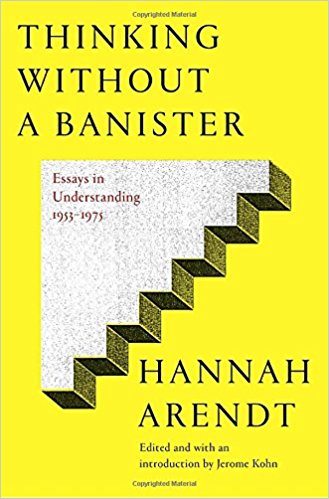
“How can anyone have an opinion who is not informed?” Hannah Arendt asks. “If everyone lies to you, the consequence is not that you believe the lies, but that no one believes anything at all anymore.”
That statement sums up where we are today with oceans of Fake News and “alternative facts” cascading over us daily. Amid all this confusion and chaos, reading Hannah Arendt’s essays both enlightens and refreshes my spirit. I’ve read Hannah Arendt’s books for decades. Arendt addresses issues of politics, freedom, and civil rights. Thinking Without a Banister covers a lot of ground. If I had to pick my favorite essay in this collection it would be “Is America by Nature a Violent Society?” Arendt doesn’t deliver easy answers or glib sound-bites. She gives you analysis and reasons for her opinions. Some of these essays are dated. I’m not sure many people want to read about the Hungarian Revolution (perhaps Wolf would), but the majority of the essays in this book discuss timeless topics like war, peace, and the pursuit of happiness. I highly recommend Hannah Arendt’s Thinking Without a Banister for relief in our troubled times. GRADE: A
TABLE OF CONTENTS:
Introduction by Jerome Kohn ix
Acknowledgments xxxi
Publication History . xxxiii
Karl Marx and the Tradition of Western Political Thought 3
I. The Broken Thread of Tradition 3
II. The Modern Challenge to Tradition 16
The Great Tradition 45
I. Law and Power 45
II. Ruling and Being Ruled 56
Authority in the Twentieth Century 69
Letter to Robert M. Hutchins 92
The Hungarian Revolution and Totalitarian Imperialism 105
Totalitarianism 157
Culture and Politics 160
Challenges to Traditional Ethics: A Response to Michael Polanyi 185
Reflections on the 1960 National Conventions: Kennedy vs. Nixon 192
Action and the “Pursuit of Happiness” 201
Freedom and Politics, a Lecture 220
The Cold War and the West 245
Nation-State and Democracy 255
Kennedy and After 262
Nathalie Sarraute 265
“As If Speaking to a Brick Wall”: A Conversation with Joachim Fest 274
Labor, Work, Action 291
Politics and Crime: An Exchange of Letters 308
Introduction to The Warriors by J. Glenn Gray 316
On the Human Condition 323
The Crisis Character of Modern Society 328
Revolution and Freedom, a Lecture 332
Is America by Nature a Violent Society? 355
The Possessed 360
“The Freedom to Be Free”: The Conditions and Meaning of Revolution 368
Imagination 387
He’s All Dwight 395
Emerson-Thoreau Medal Address 403
The Archimedean Point 406
Heidegger at Eighty 419
For Martin Heidegger 432
War Crimes and the American Conscience 433
Letter to the Editor of The New York Review of Books 434
Values in Contemporary Society 438
Hannah Arendt on Hannah Arendt 443
Remarks 476
Address to the Advisory Council on Philosophy at Princeton University 485
Interview with Roger Errera 489
Public Rights and Private Interests: A Response to Charles Frankel 506
Preliminary Remarks About the Life of the Mind 513
Transition 517
Remembering Wystan H. Auden, Who Died in the Night of the Twenty-eighth of
September, 1973 525
Index 535
Sometimes reading essays from great people like Hannah and then looking at today’s world gives me the creeps – are we on a road backwards in time, to the Middle Ages even?
I just wrote this on a forum on Hungary – where many US citizens who (or their parents) came to the States in/after 1956 participate:
What really disturbs me is the rise of these autocrats everywhere and the fact that many people applaud and even adore them.
After Erdogan’s “win” Orbán was the first to congratulate and Turks in Germany drove around in their cars applauding their “Großer Führer” – Orbán also was called the leader by his fans here.
PS and not too much OT:
My dear mother told me a long time ago that AH was called (of course not in public) the GRÖFAZ:
Größter Führer aller Zeiten (Greatest leader of all times)
Now it seems that Trump, Orbán, Erdogan and Putin (maybe others too …) are competing for that title.
Wolf, we’re facing dire times. Trump, Orban, Erdogan, and Putin are driving us over a cliff!
May, Narendra Modi, Xi Jinping, Netanyahu, don’t know yet if Ramaphosa is an improvement on Zuma, at least Stephen Harper’s gone up north…we’ll see if Conte is good for Italy or the world, but not off to too promising a start…
My father was carried as an USAF airman in a troop train in the dead of night across Austria in a troop train to be cannon fodder in 1956, as Eisenhower mulled invading Hungary in support of the uprising. So, hey, the world could’ve been rather different…I wouldn’t be here…perhaps no many would be here…
Yes, Arendt is probably more relevant today than she has been in decades. You see quotes from her quite often. But I don’t think I’m up for 535 pages of this. Maybe a shorter book.
“The banality of evil” indeed.
Jeff, you can pick and choose essays in THINKING WITHOUT A BANISTER. Skip the analysis of Karl Marx and go right to the essay on “Culture and Politics.”
The people who need to read this won’t even know it exists – if they read at all except the word “Trump” on the ballot.
Rick, Arendt points out that people are easily fooled by politicians. Mass manipulation has a long history.
Discussions of this susceptibility keep coming up fr me of late. Regarding HRC as well, inevitably Trump, anyone insisting human effects on climate change are a fallacy, etc.
Yes, closing eyes, covering ears and singing “La-la-la” has been popular ever since people haven’t wanted to accept or believe…anything.